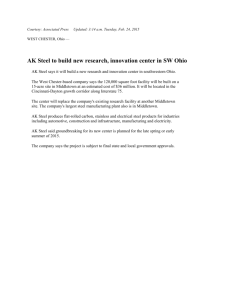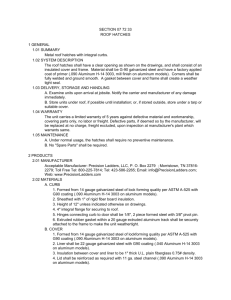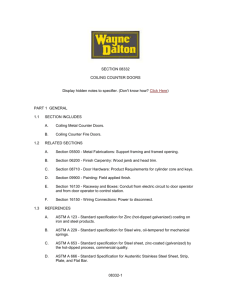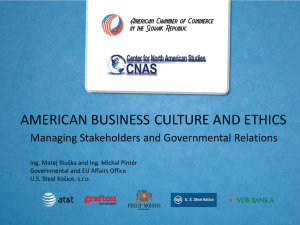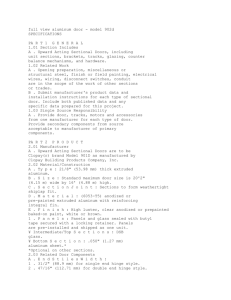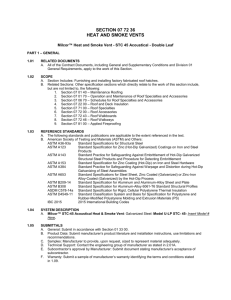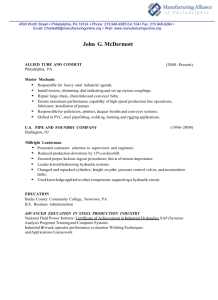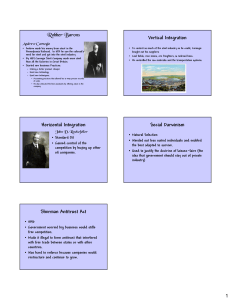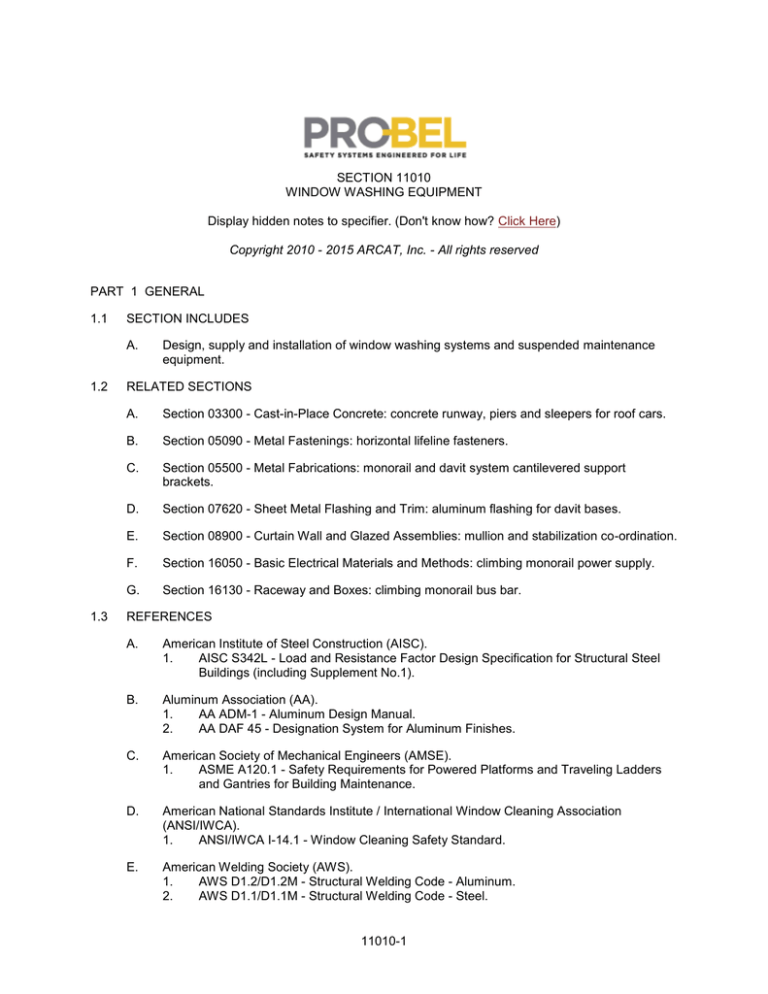
SECTION 11010
WINDOW WASHING EQUIPMENT
Display hidden notes to specifier. (Don't know how? Click Here)
Copyright 2010 - 2015 ARCAT, Inc. - All rights reserved
PART 1 GENERAL
1.1
SECTION INCLUDES
A.
1.2
1.3
Design, supply and installation of window washing systems and suspended maintenance
equipment.
RELATED SECTIONS
A.
Section 03300 - Cast-in-Place Concrete: concrete runway, piers and sleepers for roof cars.
B.
Section 05090 - Metal Fastenings: horizontal lifeline fasteners.
C.
Section 05500 - Metal Fabrications: monorail and davit system cantilevered support
brackets.
D.
Section 07620 - Sheet Metal Flashing and Trim: aluminum flashing for davit bases.
E.
Section 08900 - Curtain Wall and Glazed Assemblies: mullion and stabilization co-ordination.
F.
Section 16050 - Basic Electrical Materials and Methods: climbing monorail power supply.
G.
Section 16130 - Raceway and Boxes: climbing monorail bus bar.
REFERENCES
A.
American Institute of Steel Construction (AISC).
1.
AISC S342L - Load and Resistance Factor Design Specification for Structural Steel
Buildings (including Supplement No.1).
B.
Aluminum Association (AA).
1.
AA ADM-1 - Aluminum Design Manual.
2.
AA DAF 45 - Designation System for Aluminum Finishes.
C.
American Society of Mechanical Engineers (AMSE).
1.
ASME A120.1 - Safety Requirements for Powered Platforms and Traveling Ladders
and Gantries for Building Maintenance.
D.
American National Standards Institute / International Window Cleaning Association
(ANSI/IWCA).
1.
ANSI/IWCA I-14.1 - Window Cleaning Safety Standard.
E.
American Welding Society (AWS).
1.
AWS D1.2/D1.2M - Structural Welding Code - Aluminum.
2.
AWS D1.1/D1.1M - Structural Welding Code - Steel.
11010-1
1.4
1.5
F.
ASTM International (ASTM).
1.
ASTM A123/A123M - Standard Specification for Zinc (Hot-Dip Galvanized) Coatings
on Iron and Steel Products.
2.
ASTM A167 - Specification for Stainless and Heat Resisting Chromium Nickel Steel
Plate, Sheet and Strip.
3.
ASTM A276 - Standard Specification for Stainless Steel Bars and Shapes.
4.
ASTM A492 - Standard Specification for Stainless Steel Rope.
5.
ASTM B221 - Standard Specification for Aluminum and Aluminum-Alloy Extruded
Bars, Rods, Wire, Profiles, and Tubes.
G.
International Code Council (ICC).
1.
International Building Code.
H.
Occupational Safety and Health Administration (OSHA).
1.
OSHA 1910, Subpart D, Walking and Work Surfaces.
2.
OSHA 1910, Subpart F, Appendix C, Personal Fall Arrest Systems.
3.
OSHA Ruling on Window Cleaning by Bosun's Chair.
4.
OSHA 1910.66 Subpart F, Powered Platforms.
I.
National Roofing Contractors Association (NRCA)
1.
The NRCA Roofing and Waterproofing Manual, Fifth Edition.
ACTION SUBMITTALS
A.
General: Submit listed action submittals in accordance with Contract Conditions and Section
01300 - Submittals.
B.
Shop Drawings: Indicate information on shop drawings as follows:
1.
Submit shop drawings showing complete layout and configuration of window cleaning
and suspended maintenance system, including components and accessories.
2.
Indicate design and fabrication details, window "drops", hardware, and installation
details.
3.
Include installation and rigging instructions and:
a.
Required restrictive working usage and general safety notes.
b.
Non-restrictive working usage and general safety notes.
4.
Ensure Shop Drawings are reviewed by Engineer licensed in State of Project location
and submit calculations and test reports to Architect.
C.
Samples as follows: Duplicate 12 inches (305 mm) samples of monorail sections.
INFORMATIONAL SUBMITTALS
A.
Product Data: Manufacturer's data sheets on each product to be used, including:
1.
Preparation instructions and recommendations.
2.
Storage and handling requirements and recommendations.
3.
Installation methods.
B.
Quality Assurance:
1.
Test Reports: Certified test reports showing compliance with specified performance
characteristics and physical properties.
2.
Certificates: Product certificates signed by manufacturer certifying materials comply
with specified performance characteristics and criteria and physical requirements.
C.
Operating Procedures Outline Sheet (OPOS):
1.
Submit an Operating Procedures Outline System (OPOS) including necessary
elements in both pictorial and written form, to instruct employees in safe use of roof
supported building maintenance equipment or window cleaning procedures not
11010-2
covered by California Labor Code orders. Ensure that OPOS contains as a minimum,
elements as follows:
a.
Isometric or plan view pictorial drawing of building's roof, including building's
name, address, and date OPOS was prepared. Ensure drawing is legible and
kept with building's written assurance.
b.
Identification of drop zones, recommended drop sequences, scaffold
configurations, and specific building maintenance procedures including
equipment to be used.
c.
Identification of anchorage points for personal fall arrest systems and building
maintenance equipment.
d.
Identification of personal fall protection requirements and procedures for
securing equipment.
e.
Identification of dangerous areas on roof by highlighting of "Danger Zone" on
pictorial drawing.
f.
Description of means and methods to be used to transfer equipment from drop
location or between building levels.
g.
Identification of equipment limitations, load ratings, and special use conditions.
h.
Provisions for pre-operational, operation and maintenance inspections.
i.
Identification of access and egress to work locations and storage area(s) for
permanent or transportable building maintenance equipment.
j.
Indication of location and method of stabilization provided for suspended
equipment.
k.
Emergency and rescue procedures and means of communications to be used
during such procedures.
l.
Method to be used to control employee exposure to falls while in "Danger
Zone."
D.
1.6
1.7
Manufacturer's field reports as specified.
CLOSEOUT SUBMITTALS
A.
Submit 1-year standard manufacturer warranty documents as specified.
B.
Operation and Maintenance Data: Submit Operation and Maintenance data for installed
products in accordance with Section 01700 - Closeout Submittals.
1.
Include:
a.
Manufacturer's instructions covering maintenance requirements and parts
catalog giving complete list of repair and replacement parts with cuts and
identifying numbers.
b.
One copy of system Equipment Manual & Inspection Log Book, with "Initial
Inspection - Certification for Use" and "Inspection Sign-Off" forms completed.
c.
Two copies of reduced, "as-built shop drawing" showing equipment locations
and details. Ensure drawing is posted adjacent exits to roof.
QUALITY ASSURANCE
A.
Qualifications:
1.
Installer experienced in performing work of this section who has specialized in
installation of work similar to that required for this project.
2.
Manufacturer Qualifications: Manufacturer capable of providing field service
representation during construction and approving application method.
B.
Provide window washing equipment components and materials from single manufacturer.
C.
Regulatory Requirements.
1.
Comply with applicable code of local jurisdiction.
2.
Comply with OSHA regulations as follows:
11010-3
3.
D.
1.8
1.9
a.
1910, Subpart D, Walking and Working Surfaces.
b.
Appendix C to 1910 Subpart F, Personal Fall Arrest Systems.
c.
OSHA Ruling on Window Cleaning by Bosun's Chair.
d.
1910.66, Subpart F, Powered Platforms.
Comply with California State regulations as follows:
a.
Code of Regulations, Title 8 - Industrial Relations, Article 5 (Window Cleaning),
Article 6 (Powered Platforms for Exterior Building Maintenance), and Appendix
C to Article 6 (Personal Fall Arrest System).
Pre-installation Meetings: Conduct pre-installation meeting to verify project requirements,
manufacturer's installation instructions and manufacturer's warranty requirements. Comply
with Section 01300 - Administrative Procedures.
DELIVERY, STORAGE AND HANDLING
A.
General: Comply with 01600 - Product Requirements.
B.
Ordering: Comply with manufacturer's ordering instructions and lead time requirements to
avoid construction delays.
C.
Delivery:
1.
Deliver materials in manufacturer's original packaging with identification labels intact
and in sizes to suit project.
D.
Storage and Protection:
1.
Store materials protected from exposure to harmful weather conditions and at
temperature conditions recommended by manufacturer.
E.
Transportation and Handling:
1.
Ensure center of gravity of davits weighing 80 lbs (36.3 kg) or greater remains 36
inches (915 mm) maximum above safe surface while transporting.
2.
Ensure davits requiring 80 lbs (36.3 kg) or greater lifting effort are equipped with are
equipped with mechanical means of hoisting into position.
PROJECT AMBIENT CONDITIONS
A.
Installation Location: Assemble and erect components only when temperatures are above 40
degrees F (4 degrees C).
1.10 SEQUENCING
A.
Sequence with other Work and Comply with window washing equipment manufacturer's
written recommendations for sequencing construction operations.
1.11 WARRANTY
A.
Project Warranty: Refer to Contract Conditions for additional project warranty provisions.
B.
Manufacturer's Warranty: Submit, for Owner's acceptance, manufacturer's standard warranty
document executed by authorized company official. Manufacturer's warranty is in addition to,
and does not limit, other rights Owner may have under Contract Documents.
C.
Warranty: Commencing on date of substantial completion set by Architect.
PART 2 PRODUCTS
2.1
MANUFACTURERS
11010-4
2.2
A.
Acceptable Manufacturer: Pro-Bel Enterprises Limited, which is located at: 765 Westney Rd.
S.; Ajax, ON, Canada L1S 6W1; Toll Free Tel: 800-461-0575; Tel: 905-427-0616; Fax: 905427-2545; Email:request info (info@pro-bel.ca); Web:www.pro-bel.ca
B.
Substitutions: Not permitted.
C.
Requests for substitutions will be considered in accordance with provisions of Section
01600.
PROPRIETARY PRODUCTS AND SYSTEMS
A.
2.3
2.4
Manufacturer: Pro-Bel Group of Companies, Phone: (905) 427-0616, USA Toll Free: (800)
461-0575, Fax: (905) 427-2545, E-mail:info@pro-belgroup.com, Internet URL:www.probelgroup.com
DESIGN PERFORMANCE REQUIREMENTS
A.
Design window cleaning and suspended maintenance system to suit project requirements to
AISC S342L and as specified.
B.
Locate anchorages to suit suspension equipment specified.
C.
Design anchor components for cleaning and suspended maintenance equipment to ASME
A120.1.
1.
Ensure compatibility with industry standard equipment.
2.
Anchorage and anchor components: Designed by Engineer qualified in design of
window cleaning and suspended maintenance equipment and licensed in State of
Project location.
D.
Design system fall arrest safety anchors and equipment supports to AISC S342L (including
supplement No.1) and ANSI/IWCA I-14.1, and as follows:
1.
Comply with OSHA 1910, Subpart F, Appendix C.
2.
Supports for Suspended Platforms including davits, rigging sleeves and monorail:
a.
SEQ CHAPTER 1Safety factor against fracture or detachment: 4 to 1.
b.
Vertical service load: 1000 lbs (4.45 kN) minimum.
c.
Rated load against fracture: 4000 lbs (17.8 kN) minimum.
3.
Fall Arrest Safety Anchors:
a.
Fall arresting force safety factor of 2 to 1 without permanent deformation: 1800
lbs (8.0 kN) minimum.
b.
Fall arrest force against fracture or detachment:
1)
5,000 lbs (22.4 kN) minimum.
2)
5,400 lbs (24 kN) minimum.
E.
Trolley Systems: Design, fabricate and finish trolleys to ensure no structural or mechanical
deterioration over designed life that could affect security and operation considering
permanent exposure to elements.
1.
Provide rotating components with sealed-for-life rolling element bearings protected
from environment.
EQUIPMENT
A.
Provide the following equipment:
1.
SEQ CHAPTER 1Anchors.
2.
Davits.
3.
Outrigger Beams.
4.
Monorails.
5.
Horizontal Trolley Rail Systems.
11010-5
6.
7.
8.
9.
10.
11.
12.
13.
14.
2.5
2.6
Permanent Powered Platforms.
Work Cages.
Rigging Sleeves.
Hands-Free Horizontal Lifelines.
Double Lanyard Horizontal Lifeline Systems.
Davit Carriages.
Traveling Gantries.
Rolling Ladders.
Powered Roof Cars.
ANCHORS
A.
Safety U-bars:
1.
U-bar: 0.75 inches (19 mm) minimum diameter material with 1.5 inches (38 mm) eye
opening.
2.
Material: Stainless steel to ASTM A276,Type 304 with 35 Ksi (240 MPa) minimum
yield strength.
3.
Material: Mild steel, Type 300W with 44 Ksi (300 MPa) minimum yield strength, hotdip galvanized to ASTM A123/A123M.
B.
Safety Anchor Eye Plate: Mild steel, Type 300W with 44 Ksi (300 MPa) minimum yield
strength, hot-dip galvanized to ASTM A123/A123M.
1.
Plate: 0.875 inches (22 mm) diameter material with 2 inches (50 mm) eye opening.
C.
Hollow Steel Section (HSS) Piers: Mild steel, Type 300W with 50 Ksi (350 MPa) minimum
yield strength.
1.
Wall thickness to suit application or as indicated.
2.
Hot dipped galvanized to ASTM A123/A123M.
3.
Manufacturer's polyurethane/polyurea coating system.
D.
Plate and other sections: Mild steel, Type 300W with 44 Ksi (300 MPa) minimum yield
strength.
1.
Wall thickness to suit application or as indicated.
2.
Hot dipped galvanized to ASTM A123/A123M.
3.
Manufacturer's polyurethane/polyurea coating system.
E.
Seamless Spun Aluminum Flashing (for Roof Anchors): To AA ADM-1 Type 6061-T6 alloy
and to ASTM B221.
1.
Deck Flange Flashing: Acceptable material: Pro-Bel Group, Aluminum Deck Flange
Flashing.
2.
To NRCA Roofing and Waterproofing Manual recommendations.
3.
In accordance with Section 07620.
4.
Conformable mastic tape and torch applied heat-shrink rubber collar flashing.
5.
Detachable watertight stainless steel cap.
F.
Miscellaneous Bolts, Nuts and Washers:
1.
Mild steel, Type 300W with 44 Ksi (300 MPa) minimum yield strength, hot-dip
galvanized to ASTM A123/A123M.
2.
Stainless steel to ASTM A276, Type 304 with 35 Ksi (240 MPa) minimum yield
strength.
DAVITS
A.
Acceptable Material: Pro-Bel Group, Davit System.
B.
Davit Booms:
1.
Ground rigged, aluminum sections of engineered length and size to suit application or
11010-6
2.
3.
2.7
as indicated, equipped with carrying handles and designed to carry 1000 lbs (4.5 kN)
vertical service load, minimum.
a.
Stainless steel rolling trolley on outboard end.
b.
Stainless steel friction trolley on outboard end.
c.
Galvanized fixed shackle on outboard end.
Roof rigged, aluminum sections of engineered length and size to suit application or as
indicated, equipped with carrying handles and designed to carry 1000 lbs (4.5 kN)
vertical service load, minimum.
a.
Stainless steel rolling trolley on outboard end.
b.
Stainless steel friction trolley on outboard end.
c.
Galvanized fixed shackle on outboard end.
Provide non-corrosive UV resistant data plate stating Maximum Service Capacity of
boom, Manufacturer's Name, Serial No., Manufacturing Date, rated load and other
pertinent information prominently displayed.
C.
Davit Masts: Round tubular section capable of rotating through 360 degree with carrying
handles and connecting pins.
1.
Material: Aluminum.
2.
Material: Steel.
D.
Davit Arms: Davits to be demountable, portable, capable of being easily and quickly broken
down into pieces weighing not more than the following:
1.
80 lbs (36.3 kg) maximum.
2.
140 lbs (73 kg) maximum.
3.
Ensure davit arm booms equipped with rolling trolleys or friction trolleys have stops to
prevent detachment from boom.
4.
Provide hoisting winches and dolly wheels.
E.
Davit Bases: Round, mild steel, hollow section piers, Type 350W with 50 Ksi (350 MPa)
minimum yield strength.
1.
Hot dipped galvanized to ASTM A123/A123M]
2.
Manufacturer's polyurethane/polyurea coating system.
3.
Provide 0.75 inches (19 mm) diameter U-bar safety anchor, and securement to suit
application as indicated or required.
OUTRIGGER BEAMS
A.
Acceptable Material: Pro-Bel Group, Outrigger Beam System.
B.
Outrigger Beam Type: Engineered length and size to suit application as indicated designed
to carry 1000 lbs (4.5 kN) vertical service load, minimum.
1.
Aluminum "I" beam.
2.
Galvanized steel "I" beam.
3.
Galvanized hollow steel section.
4.
Equipped with shackle on outboard end.
5.
Equipped with friction U-bar on outboard end.
6.
Equipped with trolley on outboard end.
7.
Provide non-corrosive UV Resistant data plate stating Maximum Service Capacity of
boom, Manufacturer's Name, Serial No., Manufacturing Date, rated load and other
pertinent information prominently displayed.
8.
Provide outrigger beams equipped with rolling or friction trolleys with stops to prevent
detachment from beam.
9.
Safety U-bars:
a.
U-bar: 0.75 inches (19 mm) minimum diameter material with 1.5 inches (38
mm) eye opening.
b.
Material: Stainless steel to ASTM A276,Type 304 with 35 Ksi (240 MPa)
minimum yield strength.
11010-7
c.
2.8
Material: Mild steel, Type 300W with 44 Ksi (300 MPa) minimum yield strength,
hot-dip galvanized to ASTM A123/A123M.
C.
Outrigger Base/Roof Anchor Hollow Steel Section (HSS) piers: Hollow steel section (HSS)
piers: Mild steel, Type 300W with 50 Ksi (350 MPa) minimum yield strength.
1.
Wall thickness to suit application or as indicated.
2.
Hot dipped galvanized to ASTM A123/A123M.
3.
Manufacturer's polyurethane/polyurea coating system.
D.
Swivel-type Beam Base: Round hollow section (HSS) piers of mild steel, Type 350W with 50
Ksi (350 MPa) minimum yield strength.
1.
Ensure base allows swivel-type beam to rotate 360 degree under load.
2.
Hot dipped galvanized to ASTM A123/A123M.
3.
Manufacturer's polyurethane/polyurea coating system.
4.
Provide 0.75 inches (19 mm) diameter U-bar safety anchor, and securement to suit
application as indicated or required.
E.
Beam Dolly:
1.
Galvanized steel with pneumatic type rubber wheels, sized to suit beam as indicated.
2.
Aluminum with pneumatic type rubber wheels, sized to suit beam as indicated.
MONORAILS
A.
Acceptable Materials: Pro-Bel Group, Monorail System.
B.
Monorails and Mounting: 50 Ksi (350 MPa) minimum yield strength and 65 Ksi (450 MPa),
minimum tensile strength and designed to carry 1000 lbs (4.5 kN) minimum vertical service
load.
1.
Aluminum extrusions to ASTM B221.
2.
Cold rolled hollow steel sections, Type 350W, galvanized to ASTM A123/A123M.
C.
Monorail Finish:
1.
Exterior: Aluminum Mill, to AA DAF-45.
2.
Exterior: Aluminum Anodized, to AA DAF-45.
3.
Exterior: Galvanized steel with polyester or polyurethane powder coated baked
enamel color, from manufacturer's standard range.
4.
Exterior: Galvanized steel with polyester or polyurethane powder coated baked
enamel color, custom color.
5.
Interior: Shop applied epoxy.
6.
Interior: Shop applied hybrid powder coated.
7.
Interior: Enamel painted on site.
D.
Capacity/Data Plates: Provide non-corrosive data plate stating Maximum Service Capacity of
monorail, Manufacturer's Name, Serial No., Manufacturing Date, rated load and other
pertinent information prominently displayed.
E.
Trolleys: Heavy-duty, Corrosion resistant, weatherproof rollers, 0.625 inches (16 mm)
minimum diameter stainless steel U-bar safety anchors to ASTM A276,Type 304 exterior
finish.
1.
Interior finish to be powder coated mild steel to match monorail.
2.
Ensure trolleys to run freely under load with minimum discontinuity at rail splices.
3.
Provide removable end stops.
F.
Support Brackets: Locate brackets as close to and no greater than 16 inches (400 mm) from
monorail joints.
1.
Cantilevered aluminum brackets as indicated in accordance with Section 05500.
2.
Cantilevered stainless steel brackets as indicated in accordance with Section 05500.
11010-8
3.
2.9
Cantilevered galvanized steel brackets as indicated in accordance with Section
05500.
CLIMBING MONORAILS
A.
Acceptable Material: Pro-Bel Group, Climbing Monorail System.
B.
Monorails and Mounting: 50 Ksi (350 MPa) minimum yield strength and 65 Ksi (450 MPa),
minimum tensile strength and designed to carry 1000 lbs (4.5 kN) minimum vertical service
load.
1.
Aluminum extrusions to ASTM B221.
2.
Cold rolled hollow steel sections, Type 350W, galvanized to ASTM A123/A123M.
C.
Monorail Finish:
1.
Exterior: Aluminum Mill, to AA DAF-45.
2.
Exterior: Aluminum Anodized, to AA DAF-45.
3.
Exterior: Galvanized steel with polyester or polyurethane powder coated baked
enamel color, from manufacturer's standard range.
4.
Exterior: Galvanized steel with polyester or polyurethane powder coated baked
enamel color, custom color.
5.
Interior: Shop applied epoxy.
6.
Interior: Shop applied hybrid powder coated.
7.
Interior: Enamel painted on site.
D.
Capacity/Data Plates: Ensure non-corrosive data plate stating Maximum Service Capacity of
climbing monorail, Manufacturer's Name, Serial No., Manufacturing Date, rated load and
other pertinent information is prominently displayed.
E.
Trolleys: Corrosion resistant, weatherproof electric powered climbing trolleys with heavy-duty
rollers and 0.625 inches (16 mm) minimum diameter stainless steel U-bar safety anchors
ASTM A276,Type 304 exterior finish.
1.
Interior finish to be powder coated mild steel to match monorail.
2.
Trolleys shall run freely under load with minimum discontinuity at rail splices.
3.
Provide removable end stops.
4.
Provide locking facility at parking location.
5.
Traversing speed: 20 feet per minute (6 meters per minute).
F.
Drive System: Mechanically positive trolley drive system.
1.
Equip trolleys with 2 power packs employing friction between trolley wheels and track.
2.
Trolleys shall operate safely on wet or frost covered tracks.
3.
Incorporate back slide safety prevention devices to ASME A120.1.
G.
Operation: Provide pendant control including separate, sufficiently long plug-in pendant
control to drive trolleys to upper limit when not in use.
1.
Controls: Constant pressure type with "Forward", "Reverse" and "Emergency Stop"
buttons.
2.
Operable from platform.
3.
Operable from bosun's chair.
H.
Electrical Busbar System: In accordance with Section16130.
1.
Connect to building power supply in accordance with Section 16050.
2.
Ensure system has capacity to provide power from climbing monorail.
I.
Automatic Braking System: Provide each trolley with brake to engage whenever power to
trolley is interrupted by controls or power failure.
1.
Provide brakes to hold trolley on sloped monorail during operation.
2.
Equip brakes with over speed sensor capable of stopping trolley during over speed or
11010-9
free movement due to failure of drive train system.
J.
Power Supply: Co-ordinate location of receptacles with Section 16050.
K.
Support Brackets: Locate brackets as close to and no greater than 16 inches (400 mm) from
monorail joints.
1.
Cantilevered aluminum brackets as indicated in accordance with Section 05500.
2.
Cantilevered stainless steel brackets as indicated in accordance with Section 05500.
3.
Cantilevered galvanized steel brackets as indicated in accordance with Section
05500.
2.10 HORIZONTAL TROLLEY RAIL SYSTEM
A.
Acceptable Materials: Pro-Bel Group, Horizontal Trolley Rail System.
B.
Horizontal Rails and Mounting: 50 Ksi (350 MPa) minimum yield strength and 65 Ksi (450
MPa), minimum tensile strength and designed to carry 1000 lbs (4.5 kN) minimum vertical
service load.
1.
Aluminum extrusions to ASTM B221.
2.
Cold rolled hollow steel sections, Type 350W, galvanized to ASTM A123/A123M.
C.
Monorail Finish:
1.
Exterior: Aluminum Mill, to AA DAF-45.
2.
Exterior: Aluminum Anodized, to AA DAF-45.
3.
Exterior: Galvanized steel with polyester or polyurethane powder coated baked
enamel color, from manufacturer's standard range.
4.
Exterior: Galvanized steel with polyester or polyurethane powder coated baked
enamel color, custom color.
5.
Interior: Shop applied epoxy.
6.
Interior: Shop applied hybrid powder coated.
7.
Interior: Enamel painted on site.
D.
Capacity/Data Plates: Ensure non-corrosive data plate stating Maximum Service Capacity of
trolley rail system, Manufacturer's Name, Serial No., Manufacturing Date, rated load and
other pertinent information is prominently displayed at rail entry system.
E.
Trolleys: Heavy-duty, Corrosion resistant, weatherproof rollers and 0.625 inches (16 mm)
minimum diameter stainless steel U-bar safety anchors ASTM A276,Type 304 exterior finish.
1.
Interior finish: Powder coated mild steel to match monorail.
2.
Trolleys shall run freely under load with minimum discontinuity at rail splices.
3.
Provide removable end stops.
2.11 PERMANENT POWERED PLATFORMS
A.
Acceptable Material: Pro-Bel Group, Permanent Powered Platform.
B.
Suspended Platform: Type 6061-T6 aluminum alloy to ASTM B221, mill and powder coated
finished modular platform system to ASME A120.1, engineered length and width to suit
application as indicated and based on load bearing frame, with non-slip, aluminum deck, soft
rubber wall rollers and caster wheels.
1.
Provide integral, detachable 36 inches (915 mm) long single work cage at one end
complete with necessary components to meet project requirements.
2.
Comply with OSHA 1910.66 Subpart F, Powered Platforms.
3.
powerpower
C.
Frame and Rails:
1.
Side Frames and Connecting Frames: Structural aluminum.
11010-10
2.
3.
4.
5.
Side Frames and Connecting Frames: Galvanized mild steel.
Side Frames and Connecting Frames: Powder coated steel.
Guard rails and guard rails posts: Square, thick wall aluminum extrusions with rails 36
inches (915 mm) minimum, above deck level at working side of platform, 42 inches
(1067 mm) at non-working side.
Include 3.5 inches (90 mm) high toe-board around circumference of platform with
spaces between toe-board and top guardrails covered with expanded aluminum
screen.
a.
SEQ CHAPTER 1Leave space between intermediate guardrail and top
guardrail open without aluminum screen at front side of platform.
D.
Stirrups: Fitted with manufacturer's standard hoist unit, top limit switch assembly, striker
plate, and high "fair lead".
1.
Material: Structural aluminum.
2.
Material: Galvanized mild steel.
3.
Material: Powder coated steel.
4.
Wire winders:
a.
Electric powered
b.
Passive type]
c.
Single drum built into stirrups.
d.
Twin drum built into stirrups.
e.
Capacity: As required to suit project requirements.
f.
Dimensions: As required to suit project requirements.
E.
Cable Storage Bin: Include cable storage bin on rear guard rail.
1.
Capacity: As required to suit project requirements.
2.
Dimensions: As required to suit project requirements.
F.
Safety Controls:
1.
Electro mechanical overload system: Integral with each hoist preset to safe working
load plus 25% minimum, and designed to operate limit switch and cut power supply if
platform overloads.
2.
Include upper limit switch assembly at each stirrup top and ensure system cuts
electric power supply when switch contacts striker plate on suspension rope at top
limit of travel.
3.
Lower limit trip bar assembly: Hinged aluminum bar at each end of platform working
face underside.
a.
Design to ensure limit switch interrupt electric power supply to both hoists if bar
is pushed upwards by obstruction on building facade during descent. Ensure
system continues to allow platform to operate in upward direction.
G.
Main and Auxiliary Control Boxes: Include electric control gear for both hoists and wire
winder motors contained in central control box and mounted on rear guardrail. Include
components as follows:
1.
Switches marked "UP/DOWN" and "HOLD TO RUN".
2.
Hoist selector switch marked "LEFT/RIGHT/BOTH".
3.
Bottom trip bar over-ride button.
4.
Emergency stop button.
5.
Platform self-leveling system.
6.
Power "ON" indicator light.
7.
Three phase protection and light indicator.
8.
Locking facility on main switch.
9.
Hand wheel for manual hoist operation.
10.
Watertight electrical "quick" connections.
H.
Hoist Unit: Power platform using two UL listed traction type hoists with features as follows:
1.
30 amp 230 volt 60 Hertz hoist with lift capacity to suit platform weight and live load.
11010-11
2.
3.
4.
5.
6.
7.
8.
9.
35 feet per minute (10.7 meters per minute) minimum speed.
Slack rope safety device acting on safety rope.
Electro mechanical overload system.
Electro mechanical main brake.
"No Power" controlled emergency descent system.
Hoist protection cover.
Main line power protection: HBL2720SW, NEMA No.15-30R.
a.
Acceptable material: Hubbell Twist-Lock 230 volts, 3 phase, 60 Hertz, 30 amps
receptacle .
Main line power protection: HBL2620SW, NEMA No. L6-30R.
a.
Acceptable material: Hubbell Twist-Lock 230 volts, 3 phase, 60 Hertz, 30 amps
receptacle .
I.
Steel Wire Rope:
1.
Ensure platform is complete with two, 6 x 19 Seale and IWRC, 0.3125 inches (8 mm)
minimum diameter galvanized high tensile steel wire ropes, length to suit project
requirements.
2.
Ensure platform is complete with four, 6 x 19 Seale and IWRC, 0.3125 inches (8 mm)
minimum diameter galvanized high tensile steel wire ropes, length to suit project
requirements.
3.
Ensure each rope include 3 lbs (1.4 kg) minimum safety hook with thimble talurit
clamp and brazed "bullet-end".
J.
Electrical Supply Cable: Fit trailing supply cable with cable support clamp and CEE plug for
connection to central control box. and supplied with cable support clamp.
1.
SEQ CHAPTER 1Electrical supply cables: 100 feet (30 m) long with reinforced core.
2.
SEQ CHAPTER 1Electrical supply cables: 400 feet (120 m) long with reinforced
core.
K.
Powered Platform Accessories:
1.
Portable fire extinguisher securely attached to platform.
2.
Water container attached to rear guard rail.
3.
Electric power tool receptacle on central control box.
L.
Powered Platform Stabilization (Tie-In Guides):
1.
Continuous stabilization: Provide guide roller/sliding shoe assembly at each end of
bottom of platform designed to provide continuous engagement between platform and
internal tracks.
a.
Co-ordinate design with curtain wall manufacturer to ensure smooth operation.
b.
Internal track tie-in guides: Opening 1 inch (25 mm) minimum with 2.5 by 2.5
inches (64 x 64 mm) minimum inside dimensions. Design tracks to ensure
platform trolleys can be inserted from top and bottom of building.
2.
Intermittent stabilization anchor buttons: Buttons - Stainless steel, 1.5 inches diameter
by 0.1875 inches (38 mm diameter by 5 mm) thick with Allen head recess, with
threaded stainless steel building anchor insert of size and configuration to suit building
facade. Include sufficient quantity of stainless steel stabilizer ties.
a.
Acceptable material: Pro-Bel Group, Stainless Steel Stabilization Buttons.
b.
Working load: To AISC S342L, 300 lbs (1.33]kN) minimum.
c.
Load against fracture or detachment: To AISC S342L, 600 lbs (2.67 kN)
minimum.
d.
Locate buttons in line with davit base suspension points.
1)
Every third floor.
2)
40 feet (12.2 m) maximum.
3)
50 feet (15.3 m) maximum.
3.
Detent pins: Stainless steel tie handles with spring loaded ball lock to suit building
facade. Include sufficient quantity of [stainless steel] stabilizer ties.
11010-12
a.
b.
c.
d.
e.
f.
Acceptable material: Pro-Bel Group, Stainless Steel Detent Pins.
Size: 0.3125 inch (8 mm) diameter.
Size: 0.375 inch (10 mm) diameter.
Working load: To AISC S342L, 300 lbs (1.33 kN) minimum.
Load against fracture or detachment: To AISC S342L, 600 lbs (2.67 kN)
minimum.
Locate detent pins in line with davit base suspension points.
1)
Every third floor.
2)
40 feet (12.2 m) maximum.
3)
50 feet (15.3 m) maximum.
2.12 SINGLE WORK CAGE
A.
Acceptable Material: Pro-Bel Group, Single Work Cage.
B.
Work Cage: Type 6061-T6 aluminum alloy to ASTM B221, mill and powder coated finished
modular platform system to ASME A120.1, 36 inches (915 mm) long, width to suit
application as indicated and based on load bearing frame, with non-slip, aluminum deck, soft
rubber wall rollers and caster wheels.
1.
Comply with OSHA 1910.66 Subpart F, Powered Platforms.
C.
Frame and Rails:
1.
Side Frames and Connecting Frames: Structural aluminum.
2.
Side Frames and Connecting Frames: Galvanized mild steel.
3.
Side Frames and Connecting Frames: Powder coated steel.
4.
Guard rails and guard rails posts: Square, thick wall aluminum extrusions with rails 36
inches (915 mm) minimum, above deck level at working side of platform, 42 inches
(1067 mm) at non-working side.
5.
Include 3.5 inches (90 mm) high toe-board around circumference of platform with
spaces between toe-board and top guardrails covered with expanded aluminum
screen.
a.
SEQ CHAPTER 1Leave space between intermediate guardrail and top
guardrail open without aluminum screen at front side of platform.
D.
Stirrups: Fitted with manufacturer's standard hoist unit, top limit switch assembly, striker
plate, and high "fair lead".
1.
Material: Structural aluminum.
2.
Material: Galvanized mild steel.
3.
Material: Powder coated steel.
4.
Wire winders:
a.
Electric powered
b.
Passive type]
c.
Single drum built into stirrups.
d.
Twin drum built into stirrups.
e.
Capacity: As required to suit project requirements.
f.
Dimensions: As required to suit project requirements.
E.
Cable Storage Bin: Include cable storage bin on rear guard rail.
1.
Capacity: As required to suit project requirements.
2.
Dimensions: As required to suit project requirements.
F.
Safety Controls:
1.
Electro mechanical overload system: Integral with each hoist preset to safe working
load plus 25% minimum, and designed to operate limit switch and cut power supply if
platform overloads.
2.
Include upper limit switch assembly at each stirrup top and ensure system cuts
electric power supply when switch contacts striker plate on suspension rope at top
11010-13
3.
limit of travel.
Lower limit trip bar assembly: Hinged aluminum bar at each end of platform working
face underside.
a.
Design to ensure limit switch interrupt electric power supply to both hoists if bar
is pushed upwards by obstruction on building facade during descent. Ensure
system continues to allow platform to operate in upward direction.
G.
Main and Auxiliary Control Boxes: Include electric control gear for both hoists and wire
winder motors contained in central control box and mounted on rear guardrail. Include
components as follows:
1.
Switches marked "UP/DOWN" and "HOLD TO RUN".
2.
Hoist selector switch marked "LEFT/RIGHT/BOTH".
3.
Bottom trip bar over-ride button.
4.
Emergency stop button.
5.
Platform self-leveling system.
6.
Power "ON" indicator light.
7.
Three phase protection and light indicator.
8.
Locking facility on main switch.
9.
Hand wheel for manual hoist operation.
10.
Watertight electrical "quick" connections.
H.
Hoist Unit: Power platform using 2 UL listed traction type hoists with features as follows:
1.
30 amp 230 volt 60 Hertz hoist with lift capacity to suit platform weight and live load.
2.
35 feet per minute (10.7 meters per minute) minimum speed.
3.
Slack rope safety device acting on safety rope.
4.
Electro mechanical overload system.
5.
Electro mechanical main brake.
6.
"No Power" controlled emergency descent system.
7.
Hoist protection cover.
I.
Steel Wire Rope:
1.
Ensure platform is complete with two, 6 x 19 Seale and IWRC, 0.3125 inches (8 mm)
minimum diameter galvanized high tensile steel wire ropes, length to suit project
requirements.
2.
Ensure platform is complete with four, 6 x 19 Seale and IWRC, 0.3125 inches (8 mm)
minimum diameter galvanized high tensile steel wire ropes, length to suit project
requirements.
3.
Ensure each rope include 3 lbs (1.4 kg) minimum safety hook with thimble talurit
clamp and brazed "bullet-end".
J.
Electrical Supply Cable: Fit trailing supply cable with cable support clamp and CEE plug for
connection to central control box.
1.
SEQ CHAPTER 1Electrical supply cables: 100 feet (30 m) long with reinforced core.
2.
SEQ CHAPTER 1Electrical supply cables: 400 feet (120 m) long with reinforced
core.
K.
Powered Platform Accessories:
1.
Portable fire extinguisher securely attached to platform.
2.
Water container attached to rear guard rail.
3.
Electric power tool receptacle on central control box.
2.13 SEQ CHAPTER 1RIGGING SLEEVES
A.
Acceptable Material: Pro-Bel Group, Steel Rigging Sleeves.
B.
Hollow Steel Section (HSS) Sleeves: Mild steel, Type 300W with 50 Ksi (350 MPa) minimum
yield strength.
11010-14
1.
2.
3.
4.
5.
C.
Hot dipped galvanized to ASTM A123/A123M.
Manufacturer's polyurethane/polyurea coating system.
Wall thickness to suit application as indicated with 6 inches (150 mm) inside diameter.
Wall mounted rigging sleeves: Fabricate with flip-up hinged door to accommodate
push/pull outrigger.
Curved rigging sleeves: Provide bend finished with smooth radius.
Straight Suspension Bars: Hot-dip galvanized to ASTM A123/A123M, 0.75 inch (19 mm)
minimum diameter mild steel with 35 Ksi (240 MPa) minimum yield strength.
2.14 HANDS-FREE HORIZONTAL LIFELINE
A.
Acceptable Material: Pro-Bel Group, Hands-Free Horizontal Lifeline System.
B.
Stainless steel to ASTM A492, Type 316, 0.3125 inch (8 mm) minimum diameter cable,
9127 lbs (40 kN) minimum breaking strength with permanently swedged cable ends.
C.
Data Plate: Ensure non-corrosive data plate stating Maximum Service Capacity of cable,
Manufacturer's Name, Serial No., Manufacturing Date, rated load and other pertinent
information is prominently displayed at cable system entry points.
D.
Standard Intermediate Support Brackets: Stainless steel to ASTM A167, Type 316, multiposition, with reinforcing end caps and suitable for installation at any height.
1.
Secure using 0.5 inch (13 mm) minimum diameter stainless steel fasteners.
2.
Secure using 0.5 inch (13 mm) minimum diameter galvanized fasteners.
E.
Mobile Intermediate Support Brackets: Multi position, stainless steel to ASTM A167, Type
316, multi-position, with reinforcing end caps and suitable for installation at any height.
1.
Secure using 0.5 inch (13 mm) minimum diameter stainless steel fasteners.
2.
Secure using 0.5 inch (13 mm) minimum diameter galvanized fasteners.
F.
Corner Units: 90 degree and 135 degree flexible corner units, as required, from
manufacturer's standard components to meet project requirements.
G.
End Terminal Hardware: Stainless steel swedged termination at one end and stainless steel
tensioner with shock absorber at other end to meet project requirements.
H.
Lanyard Cable Runner: Stainless steel to ASTM A167, Type 316 with automatic runner
bypass for continuous "hands-free" operation.
1.
Ensure lanyard can be inserted or removed anywhere on cable.
I.
Harness: Manufacturer's standard full body harness and lanyard with shock absorber.
2.15 DOUBLE LANYARD HORIZONTAL LIFELINE SYSTEM
A.
Acceptable Material: Pro-Bel Group, Double Lanyard Horizontal Lifeline System.
B.
Stainless steel to ASTM A492, Type 316, 0.3125 inch (8 mm) minimum diameter cable,
9127 lbs (40 kN) minimum breaking strength.
1.
With permanently swedged cable ends.
2.
With mechanically swedged cable ends.
C.
Data plate: Ensure non-corrosive data plate stating Maximum Service Capacity of cable,
Manufacturer's Name, Serial No., Manufacturing Date, rated load and other pertinent
information is prominently displayed at cable system entry points.
D.
Tensioner: Stainless steel turnbuckle to ASTM A167, Type 316.
11010-15
E.
Harness: Manufacturer's standard full body harness with double shock absorber lanyard.
2.16 DAVIT CARRIAGES
A.
Acceptable Material:
1.
Pro-Bel Group, Electrically Powered Davit Carriage.
2.
Pro-Bel Group, Manually Operated Davit Carriage.
B.
Carriages: Mounted on horizontal rails, with two piece tip-up davit arm system operating on
trolleys.
1.
Raise and lower carriage using portable winch.
2.
Ensure davit arms can be locked into position.
C.
Stability Factor:
1.
Calculate while considering suspended platform is in most outboard traversing
positions for traversing, operating and storage.
2.
Test while considering suspended platform is in most outboard traversing positions for
traversing, operating and storage.
3.
Obtain system stability by attachment to structural supports and track system, as
follows:
a.
Horizontal traversing stability factor: 4 to 1 minimum including impact effect
when using 10 psf (0.479 kPa) minimum wind load applied to equipment.
b.
SEQ CHAPTER 1Ensure equipment can withstand wind loads expected in
geographic area of project. Maximum wind velocity: 100 mph (61 kph).
4.
Submit reports in accordance with Contract Conditions and Section 01300.
D.
Safety Guards:
1.
Include enclosures at moving parts.
2.
Include guards at moving parts.
E.
Track Works: Mild steel, Type 350W with 50 Ksi (350 MPa) minimum yield strength.
1.
Hot dipped galvanized to ASTM A123/A123M.
F.
Work Station Markings: Identify each work station location by:
1.
Markings on tracks.
2.
Indexing vanes.
3.
Positioning switches.
G.
Controls: Continuous pressure, weatherproof electric controls and operating devices.
1.
Locate on carriage.
2.
Locate on working platform.
3.
Ensure single operating device can simultaneously move multiple carriages.
4.
Include lock out feature of operating devices other than device in use.
5.
Ensure carriages operate only when:
a.
Platform is located at uppermost position of travel and is not in contact with
building face or fixed vertical stabilizer guides.
b.
Platform is at innermost position on davit arms.
c.
Protective devices and interlocks are in position for traversing.
H.
Electrically Operated Carriage Speed: 39.33 feet per minute (12 meters per minute)
maximum.
I.
Electrically Operated Carriage Accessories:
1.
Auto brakes: Include automatically applied braking system.
2.
Key lockout system
3.
Power cord interlocks.
11010-16
2.17 TRAVELING GANTRY
A.
Gantry:
1.
Operation: Manually operated to suit profile of interior atrium. Geared crank handle,
mild steel hot-dip galvanized to ASTM A123/A123M.
2.
Operation: Electric powered to suit profile of exterior atrium.
3.
Operation: Manually operated to suit profile of interior atrium. Geared crank handle,
mild steel hot-dip galvanized to ASTM A123/A123M.
4.
Operation: Electric powered to suit profile of exterior atrium.
B.
Gantry Platform: Type 6061-T6 aluminum alloy to ASTM B221, mill and powder coated
finished modular platform system to ASME A120.1, engineered length and width to suit
application as indicated and based on load bearing frame rated for two person operation,
with non-slip, aluminum deck, soft rubber wall rollers and caster wheels.
1.
Provide integral, detachable 36 inches (915 mm) long single work cage at one end
complete with necessary appurtenances to meet project requirements.
2.
Comply with OSHA 1910.66 Subpart F, Powered Platforms.
3.
Ensure gantry will not rack or twist during use.
4.
Include locking facility at each workstation and in parking location.
5.
gantrygantry
C.
Frame and Rails:
1.
Side Frames and Connecting Frames: Structural aluminum.
2.
Side Frames and Connecting Frames: Galvanized mild steel.
3.
Side Frames and Connecting Frames: Powder coated steel.
4.
Guard rails and guard rails posts: Square, thick wall aluminum extrusions with rails 42
inches (1067 mm) above deck level.
5.
Include localized stainless steel fall protection anchors.
6.
Include "dogline" for securing lifelines.
7.
Include spring loaded, sliding/retractable gates.
D.
Monorail tracks and Supports: As specified in this section.
E.
Large Diameter Wheels:
1.
Construction: Nickel cadmium plated steel with sealed ball bearings.
2.
Construction: Stainless steel with sealed ball bearings.
F.
Interior trolleys:
1.
Stainless steel to ASTM A276, Type 304 with heavy-duty rollers. Designed for straight
and radius rails as required. Provide means for servicing, repair or replacement of
trolleys as necessary.
2.
Powder coated mild steel with heavy-duty rollers. Designed for straight and radius
rails. Provide means for servicing, repair or replacement of trolleys as necessary.
G.
Safety Guards:
1.
Include enclosures at moving parts.
2.
Include guards at moving parts.
H.
Controls: Locate continuous pressure, weatherproof, electric type controls and operating
devices on working platform.
1.
Include automatically applied braking system.
2.
Include key lockout system.
I.
Gantry Traversing Speed: 39.33 feet per minute (12 meters per minute) maximum.
2.18 ROLLING LADDERS
11010-17
A.
Acceptable Material: Pro-Bel Group, Aluminum Rolling Ladder.
B.
Ladder: Type 6061-T6 aluminum alloy to ASTM B221 and to ASME A120.1, designed to
support two workers weighing 250 lbs (113 kg) minimum each.
1.
Size: 27 inches (686 mm) wide by 30 inches (762 mm) deep with serrated step rungs
and 36 inches (915 mm) high guardrails.
2.
Ladder Finish: Mill.
3.
Ladder Finish: Clear anodized.
4.
Ladder Finish: Polyester powder coated baked enamel to AA DAF-45.
5.
Ladder Finish: Polyurethane powder coated baked enamel to AA DAF-45.
6.
Color: From manufacturer's standard range.
7.
Color: Custom color.
C.
Brakes: Spring release type.
D.
Fall Protection: Include continuous fall arrest system on both sides of ladder.
E.
Pipe or I-Beam Tracks:
1.
Type 6061-T6 aluminum alloy to ASTM B221, mill and powder coated finished
modular platform system to ASME A120.1.
2.
Type 300W Mild steel with 50 Ksi (350 MPa) minimum yield strength.
a.
Hot-dip galvanized to ASTM A123/A123M.
F.
Manual Traversing Ladder Force: 11.2 pound- force (50 Newtons) maximum.
G.
Guide Rollers: Adjustable, anti-crabbing, anti-lift type acting on top track.
1.
Flanged support rollers not acceptable.
2.
Ensure rotating components include sealed for life rolling element bearings protected
from environment.
H.
Safe Access: Include safe access to ladder using horizontal lifeline.
2.19 ACCESSORlES
A.
SEQ CHAPTER 1Motorized Bosun's Chair:
1.
Acceptable material: Pro-Bel Group, Motorized Bosun's Chair Model H400.
2.
Chair Framework: High quality structural steel with shot blasted powder coated finish,
foldable upper frame with removable water buckets and holders.
a.
Overall dimensions: 51 inches (1285 mm) long by 43 inches (1132 mm) wide
by 71 inches (1810 mm) high.
b.
Rated load: 200 lbs (90 kg) minimum.
c.
Weight (without wires, electrical cable and rated load): 370 lbs. (168 kg).
d.
Finish: Blue.
e.
Finish: As scheduled.
3.
Chair Components: Include components as follows:
a.
Traction hoist.
b.
Type 3 overspeed safety brake and bracket.
c.
Overload assembly.
d.
Top limit switch.
e.
Wall rollers.
f.
Caster wheels.
g.
Safety belt.
h.
Powered twin wire reeler assembly.
i.
Water buckets and holders.
j.
Adjustable foot support.
k.
Control station.
4.
Suspension: Galvanized steel wire ropes, 0.375 inch (8.3 mm) minimum diameter,
11010-18
5.
6.
7.
8.
9.
284 psi (1960 n per mm 2) tensile strength.
a.
Wire breaking load: 5.395 ton-force (48 kN) minimum.
b.
Reeler capacity: 131 feet (40 meters).
Hoist:
a.
Lifting capacity: 882 lbs (400 kg) minimum.
Speed: 28 feet per minute (8.5 meters per minute) minimum.
Power supply: Single phase, 220/240 volts.
Power supply: Three phase, 380/440 volts.
Control voltage, 24 volts AC.
B.
Tethers: Secure pins and loose pieces with 0.125 inch (3 mm) stainless steel cable with
easily inserted lead connectors.
C.
Seamless Spun Aluminum Flashing (for Roof Anchors): To AA ADM-1 Type 6061-T6 alloy
and to ASTM B221.
1.
Deck Flange Flashing: Acceptable material: Pro-Bel Group, Aluminum Deck Flange
Flashing.
2.
To NRCA Roofing and Waterproofing Manual recommendations.
3.
In accordance with Section 07620.
4.
Conformable mastic tape and torch applied heat-shrink rubber collar flashing.
5.
Detachable watertight stainless steel cap.
D.
Manufacturer's polyurethane/polyurea coating system: 0.09375 inch (2.4 mm) minimum
thickness, black colored, two-component TPU polyurethane/polyurea coating system.
1.
Acceptable material: Pro-Bel Group, Pro-Bel Protex.
2.20 ELECTRICAL REQUIREMENTS
A.
Receptacles: Waterproof, independently protected main line power receptacles rated 208
volts, 3 phase, 60 Hertz, 30 amperes.
1.
Acceptable material: Hubbell Twist-Lock.
B.
Ensure main line power is located 100 feet (30 m) maximum from powered window washing
equipment.
C.
Ensure power outlets experience 3% maximum voltage drop under full load.
D.
Cable Wall and Roof Anchors:
1.
Acceptable material: Pro-Bel Group, Wall and Roof Anchors.
2.21 POWERED ROOF CARS
A.
Roof Car: Electric powered, supported on hard rubber tired wheels operating on reinforced
concrete bearing or similar surface cast on top of roof finish in accordance with Section
03300.
1.
Acceptable material: Pro-Bel Group, Model PT 3008 Fully Balanced Trackless Trolley.
2.
Ensure roof trolley is guided by L-shaped steel angle fixed to concrete runway in
accordance with Section 03300.
3.
Steel base frame and suspension jib: Capable of 360 degree slewing (rotating) and
luffing (up and down).
B.
Roof Car: Electric powered, fully balanced, on freestanding, twin track, galvanized I-beam
work track system supported by galvanized steel crossbeams over support foot assemblies.
1.
Acceptable material: Pro-Bel Group, Model FS-3000 Free Standing Trolley.
2.
Mount system on reinforced [concrete pads] [sleepers] bedded on top of roof finish in
accordance with Section 03300.
3.
Weight balance ratio: As approved by authorities having jurisdiction.
11010-19
4.
Steel base frame and suspension jib with luffing (up and down) capability.
C.
Roof Car: Electric powered with trolleys supported on four wheel assemblies operating on
galvanized track mounted on concrete piers and cross rails, as indicated, cast into roof slab
in accordance with Section 03300.
1.
Acceptable material: Pro-Bel Group, Model RA-3004 Roof Anchored Trolley.
2.
Steel base frame and suspension jib: Capable of 360 degree slewing (rotating) and
luffing (up and down).
D.
Roof Car: Electric powered with trolleys supported on four wheel assemblies operating on
galvanized track mounted on concrete piers and cross rails, as indicated, cast into roof slab
in accordance with Section 03300.
1.
Acceptable material: Pro-Bel Group, Model RA 3006 Roof Anchor Trolley with Jib End
Pantograph Assembly.
2.
Steel base frame and [telescoping] suspension jib: Capable of 360 degree slewing
(rotating) and luffing (up and down).
3.
Ensure pantograph assembly remains horizontal when inclination of jib changes.
4.
Ensure connection to upper turret is rotated 90 degrees.
E.
Roof Car: Electric powered with trolleys supported on four wheel assemblies operating on
galvanized track.
1.
Acceptable Material: Pro-Bel Group, Model RA-T09 Roof Anchored Trolley with Short
Single Telescopic Jib.
2.
Mounting of Track: Concrete piers cast into roof slab.
3.
Mounting of Track: Crossrails cast into roof slab.
4.
Steel base frame and telescoping suspension jib: Capable of 85 degree slewing
(rotating) in each direction.
5.
Ensure connection to upper turret is rotated 90 degrees.
F.
Roof Car: Electric powered with trolleys supported on four wheel assemblies operating on
galvanized track mounted on concrete piers cast into roof slab in accordance with Section
03300.
1.
Acceptable material: Pro-Bel Group, Model RA/22.5 Special Type/Long Reach.
2.
Steel base frame and long reach suspension jib: Capable of 360 degree slewing
(rotating) capability and luffing (up and down).
3.
Ensure pantograph assembly remains horizontal when inclination of jib changes.
4.
Ensure connecting upper turret and suspension beam assembly allow platform to
rotate 180 degrees.
G.
Roof Car: Electric powered with twin track trolley supported on four wheel assemblies
operating on galvanized lower I-beam and upper galvanized steel channel track and
mounted onto structural parapet wall.
1.
Acceptable material: Pro-Bel Group, Model WA 3007 Parapet Mounted with Twin
Track Trolley and Single Jib.
2.
Steel base frame and long reach suspension jib: Capable of 360 degree slewing
(rotating) capability and luffing (up and down).
H.
Platform: 82.25 inches (2.7 meters) long, Type 6061-T6 aluminum alloy to ASTM B221, mill
and powder coated finished modular platform system to ASME A120.1, engineered length
and width to suit application as indicated and based on load bearing frame, with non-slip,
aluminum deck, soft rubber wall rollers and caster wheels.
1.
Suspension system: 2 primary wire ropes and 2 safety wire ropes operating at hoist
speed of 29.5 feet per minute (9 meters per minute) maximum.
2.
Ensure platform hoist system is designed for horizontal travel with 39.33 feet per
minute (12 meters per minute) maximum traversing speed.
I.
Roof Car Controls as follows:
11010-20
1.
2.
3.
4.
5.
6.
J.
Key operated power supply "On/Off" control mounted on trolley.
Key operated traversing operation control:
a.
Mounted on trolley.
b.
Mounted on push button pendant control suspended from jib head.
c.
Ensure movement control push buttons require continuous finger pressure to
operate.
d.
Include "Emergency Stop" push button at each control position.
House main electrical control panel in key secured weatherproof compartment on rear
of base frame.
a.
Include ground protection unit within panel.
Attach platform electrical power supply cable to trolley jib head.
a.
Include cable storage compartment fitted to platform.
Ensure other device controls are locked when traversing control at location is used.
Ensure roof car operates only under conditions as follows:
a.
Platform is located at its uppermost position of travel; is not in contact with
building face; and is not in contact with fixed vertical stabilizer guides located
building facade.
b.
Protective devices and interlocks are in position for traversing.
Roof Car Accessories:
1.
Roof Trolley: Steel fabrication, shot blasted, hot zinc sprayed and blue color, powder
coated.
2.
Lower Base Frame Assembly: Heavy duty steel box section with wheel unit bearing
housings incorporated into frame.
a.
Include attachment points for slewing assembly.
3.
Upper Base Frame Assemblies: Heavy duty steel box sections [with attachment points
for hydraulic cylinder jib assembly].
4.
Jib Assembly: Heavy duty steel box section.
a.
Provide attachment points for hydraulic cylinder as indicated.
b.
Provide slewing bearing at jib end.
c.
Jib luffing speed: 10.25 feet per minute (3 meters per minute) minimum.
d.
Standard forward reach: 60 inches (1500 mm) minimum.
5.
Slewing Assembly: Attach to upper and lower base frame.
a.
Ensure 360 degree powered rotation using electric geared motor transmission
with push buttons controls from either control station.
b.
Slewing speed: 0.5 rpm minimum.
6.
Luffing Assembly: Heavy duty, double acting, hydraulic cylinder with electrically
operated power pack including hydraulic tank, filter, pressure relief valve, motorized
pump unit and solenoid operated directional control valves.
a.
System working pressure range: 1200 to 1500 psi (8274 to10 342 kPa).
b.
Include anti-pipe burst valve.
7.
Supply Cable Reeling Drum: Fit roof trolley with spring loaded reeling drum capable of
automatically reeling electrical power supply cable in and out between roof power
sockets and trolley.
a.
Capacity: 65 feet (20 m) minimum.
8.
Stability: Include roof car continuous stabilization
a.
Determine overturning moment as 125 percent rated load, plus maximum dead
load plus prescribed wind load.
9.
Roof car access: Include safe access to roof car and from roof car to working platform
in accordance with manufacturer's written recommendations.
10.
Storage: include provisions to secure roof car in stored position using tie-down
anchors in accordance with manufacturer's written recommendations.
a.
Ensure cars subject to wind forces are stored in accordance with ASME
A120.1.
11.
Track works: Mild steel, Type 350W with 50 Ksi (350 MPa) minimum yield strength
a.
Hot dipped galvanized to ASTM A123/A123M.
11010-21
PART 3 EXECUTION
3.1
3.2
INSTALLERS
A.
Provide experienced and qualified technicians to carry out erection, assembly and
installation of window washing and suspended maintenance equipment system.
1.
Do steel welding to AWS D1.2/D1.2M.
2.
Do aluminum welding to AWS D1.1/D1.1M.
B.
Comply with manufacturer's written data, including product technical bulletins, product
catalog installation instructions and Pro-Bel Group technical data sheets.
EXAMINATION
A.
3.3
3.4
3.5
Site Verification of Conditions:
1.
Verify that substrate conditions which have been previously installed under other
sections or contracts are acceptable for product installation in accordance with
manufacturer's instructions prior to installation of window washing equipment.
2.
Inform Architect of unacceptable conditions immediately upon discovery.
3.
Proceed with installation only after unacceptable conditions have been remedied.
PREPARATION
A.
Verify structure or substrate is adequate to support complete window washing equipment
system.
B.
Verify structural steel to receive safety anchors has adequate bearing surface as indicated
on shop drawings and has 100 percent welds between anchors and structural steel.
INSTALLATION
A.
Coordinate window washing equipment work with work of other trades, for proper time and
sequence to avoid construction delays.
B.
Install window washing equipment plumb and level in accordance with manufacturer's
written instructions.
C.
SEQ CHAPTER 1[Mechanically fasten anchors in accordance with manufacturer's
recommendations and in accordance with Section 03300.
D.
Accurately fit and align, securely fasten and install free from distortion or defects.
E.
Deform threads of tail end of anchor studs after nuts have been tightened to prevent
accidental removal and vandalism.
F.
Track Works: Install tracks straight, true and level, with 0.125 inch (3 mm) maximum step
deviation and in accordance with manufacturer's written instructions.
G.
Rolling Ladder: Ensure rolling ladder is positioned parallel to building elevation with 12
inches (305 mm) minimum clearance between rear side of ladder and building facade.
1.
Maintain clearance by means of roller guides on ladder end.
H.
Roof Car Runways: Install runways, concrete piers, cross rails and sleepers in cast-in-place
concrete in accordance with Section 03300.
FIELD QUALITY CONTROL
A.
Manufacturer's Field Services: Have manufacturer's technical representative schedule site
11010-22
visits to review work as follows:
1.
After delivery and storage of products.
2.
When preparatory work for which work of this Section depends is complete, but before
installation begins.
3.
During Installation:
a.
Weekly.
b.
2 times during progress of work at 25% and 60% of completion.
4.
Upon completion of work, after cleaning is carried out.
B.
3.6
3.7
3.8
3.9
Testing: Test On Site 100 percent of anchors relying upon chemical adhesive fasteners
using load cell test apparatus in accordance with manufacturer's written recommendations.
ADJUSTMENT
A.
Lubricate moving parts to operate smoothly and fit accurately.
B.
Complete "Initial Inspection - Certification for Use" form included in Equipment Manual and
Inspection Log Book provided by manufacturer.
FINAL CLEANING
A.
Do cleanup in accordance with Section 01700.
B.
Upon completion, remove surplus and excess materials, rubbish, tools and equipment.
PROTECTION
A.
Protect installed product from damage during construction.
B.
Repair or replace damage to adjacent materials caused by window washing equipment
installation.
MAINTENANCE
A.
Include complete maintenance on window washing equipment for 12 months after date of
acceptance by Architect.
B.
Regularly and systematically examine, clean, adjust and lubricate moving parts.
1.
Schedule: Weekly.
2.
Schedule: Semi-monthly.
3.
Schedule: Monthly.
C.
Repair or replace parts of window washing equipment whenever required due to defect and
normal wear and tear.
1.
Use only standard parts of product line of manufacturer of window washing
equipment.
2.
Maintain locally adequate stock of parts for replacement or emergency purposes.
3.
Provide personnel to perform work under supervision and in direct employ of window
washing equipment system manufacturer or manufacturer's licensed agent.
4.
Perform work during regular trade working hours satisfactory to Architect.
5.
Provide emergency call-back at no extra cost and ensure fulfillment of maintenance
and emergency service without undue loss of time to Architect.
6.
Ensure that maintenance personnel register with designated building personnel at
time of inspections and maintenance.
END OF SECTION
11010-23


